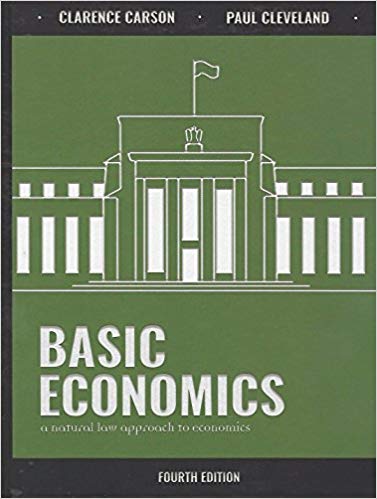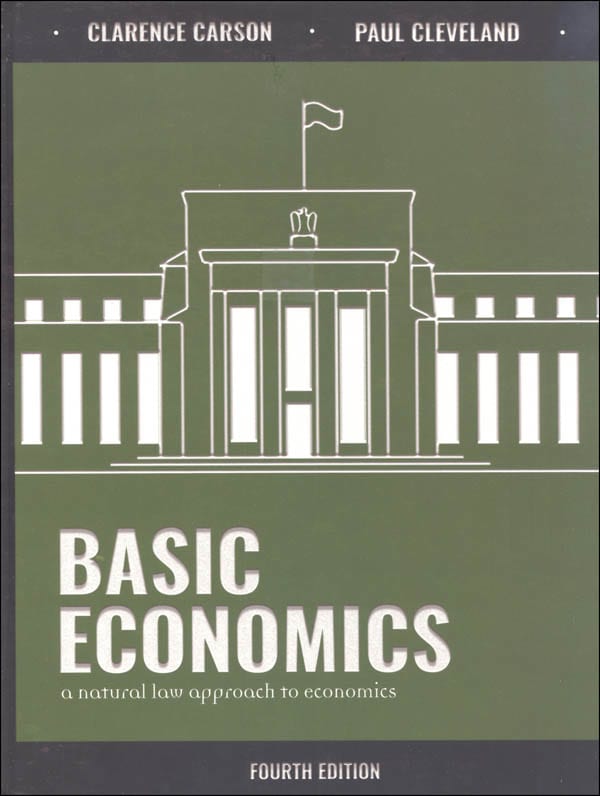Basic Economics: A Natural Law Approach to Economics, fourth edition now has a PDF teacher's guide that can be added to create a complete high school economics course. There is also an enhanced, online course option that uses the textbook as the nucleus for a complete course that includes reading, videos to watch, assignments, and quizzes. In addition, an optional Budget Project mini-course that helps students learn financial responsibility and planning is available at the publisher's website at no cost. I'll begin with a description of the textbook.
Basic Economics: A Natural Law Approach to Economics is great for students (as well as adults) who want to understand economics at a deeper level and from a Christian perspective. This textbook covers the economics topics that you find in most high school texts such as markets, supply and demand, scarcity, monopoly and competition, and the stock market. It also teaches more personally-applicable topics such as rent, wages, savings, investments, interest, and home-based businesses that are sometimes not covered in economics textbooks.
Where this textbook goes deeper is in the amount of attention given to the history of economics, the different economic schools of thought, government actions and their effects, the morality of economics, and international economics. An entire chapter addresses "Society and Morality," examining the Judeo-Christian roots of free markets, moral absolutes versus moral positivism, and utilitarianism. The last third of the book studies the "Politico-Economic Systems": the manorial feudal system, mercantilism, free enterprise, corporatism, welfarism, and communism. Capitalism is covered within the section on corporatism, and the treatment of capitalism is a good example of the nuanced approach the authors take throughout the textbook. For example, they make the distinction that capitalism does not always go hand in hand with free enterprise but is sometimes manipulated by the government at the expense of other competitors within the market.
The text reflects a Christian worldview as well as viewpoints of the Austrian school of economics that lean toward free enterprise and limited government. An example of the Christian worldview would be the reference to the Ten Commandments' prohibitions against stealing and coveting as one basis of property rights. An example of the Austrian School viewpoint is the text's treatment of the New Deal in a fairly critical manner as an unconstitutional expansion of government power. (To get a clear sense of what makes this textbook unique, you can read the first chapter for free by clicking here and scrolling down to "Sample Chapter and Table of Contents.")
The text poses challenging questions. For example, in discussing zoning laws, it points out the desire of people to not have noisy factories built next to their homes. But then it raises the problem of fragmented families because people often travel long distances to the workplace rather than working close to home, partly because of zoning laws.
Each chapter concludes with a study guide with a number of components. The study guide has a summary of the chapter which is very helpful for students who might get overwhelmed with information and ideas. "Points of Emphasis" identifies key points to remember. A series of questions probes for both comprehension and thoughtful analysis; these questions might be used either for discussion or written responses. Students might write out definitions or explanations for the list of keywords, terms, and names. Suggested activities include both independent and interactive projects, most of which require some research. Each chapter's study guide includes at least one debatable question such as, "Prepare a case either to support or oppose the following position: 'Working conditions would be horrendous if it were not for the efforts of labor unions'" (p. 162). These questions can be used for actual debate or for written position papers. Recommended reading suggestions are at the end of most chapters' study guides.
The fourth edition of Basic Economics, published in 2018, is a hardcover textbook. While the interior is printed in black and white and has no illustrations, the formatting is much improved from earlier editions. The text itself runs only the width of about two-thirds of the page. Sidebars and definitions are sometimes featured in the other third of the page, but there's more white space per page than there used to be, The overall effect of this reformatting is to make the textbook much more readable.
I describe the teacher's guide further down in this review.
Online Course
An optional online course developed by the publisher has daily assignments for a one-semester course (with access available for ten months) using the Basic Economics textbook. The online course has assignments, videos, links to other websites, and built-in quizzes and tests (with time limits) that are completed online. Students will also read The Law by Frederic Bastiat and Whatever Happened to Penny Candy? by Richard Maybury, so you will need to obtain both of those books in addition to the textbook.
The short videos that are used in most lessons are sometimes presented by one of the text's authors, Dr. Paul Cleveland, while others are from sources such as Prager University, the Foundation for Economic Education, the Acton Institute, and the Mises Institute. The videos expand upon the content in the textbook and are a significant enhancement.
For each chapter in the textbook, students will still need to write out definitions for terms, answers to review questions, and a position paper, all of which will need to be checked by a parent or teacher using the teacher's guide. The teacher's guide is included in the online course bundle for homeschoolers.
Budget Project Mini-Course
The optional Budget Project mini-course rounds out the Basic Economics course (either the textbook alone or the online course). The Budget Project's real-life budget applications balance the sometimes more philosophically-oriented textbook. It can also be used as a standalone item. Note that within the online course, about one day per week is allotted to either the Budget Project mini-course or other projects.
Students will deal with adult budget issues, complete research, and use spreadsheets as directed by the online lessons. The Budget Project culminates with a final written report. This mini-course is available free at the publisher's website.
Teacher's Guide
The PDF teacher's guide includes lesson plans that are very similar to the layout of the online course, although they don't include the videos or linked articles. (You can find URLs for some of the resources that are linked in the online course in the "For Further Study" section at the end of each of the chapter study guides in the textbook.) As with the online course, the teacher's guide requires students to also read The Law by Frederic Bastiat and Whatever Happened to Penny Candy? by Richard Maybury, and it allocates times for the Budget Project mini-course or other projects. The teacher's guide also has chapter quizzes and tests plus answer keys for the quizzes and tests as well as the end-of-chapter study guide questions,
Summary
The teacher's guide and the online course option, both new with the fourth edition of Basic Economics, transform the textbook into a comprehensive course, deeply based on both Christian and free-market principles, that should be manageable for homeschooling parents and very interesting for students.










